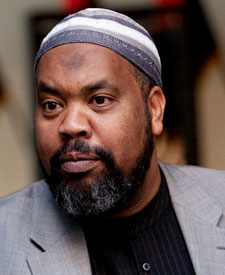


All Dulles Area Muslim Society (ADAMS) Center, Sterling, VA
Imam Mohamed Magid takes a strong stand against antisemitism and Holocaust denial and believes it's important for other Muslim leaders to do so as well.
Transcript also available in:
إطلع على الترجمة العربية للنسخة المسجلة
IMAM MOHAMED MAGID:
I do believe that we need to widen the audience, have more imams to speak against antisemitism. The imam should be and has to be a role model. And every word you say, it counts.
ALEISA FISHMAN:
Imam Mohamed Magid was born in Sudan, son of a leading Islamic scholar, and is now executive director of the All Dulles Area Muslim Society—or ADAMS Center—in Sterling, VA. Imam Magid and his mosque share a close relationship with the nearby Northern Virginia Jewish Congregation, and every Friday afternoon use the synagogue for prayers. Imam Magid takes a strong stand against antisemitism and believes it's important for other Muslim leaders to do so, as well. During a recent trip to Auschwitz, Imam Magid encouraged his fellow imams to sign the visitors' book in Arabic.
Welcome to Voices on Antisemitism, a podcast series from the United States Holocaust Memorial Museum made possible by generous support from the Oliver and Elizabeth Stanton Foundation. I'm Aleisa Fishman. Every month, we invite a guest to reflect about the many ways that antisemitism and hatred influence our world today. Here's president of the Islamic Society of North America, Imam Mohamed Magid.
IMAM MOHAMED MAGID:
I get to know Jewish people in terms of friendship. When I come to the United States, I came with my dad who had the condition of kidney failure, and I was supposed to be his donor. And his kidney doctor was a Jewish doctor. Him and my father become very close. And the surgeon doctor was an Egyptian doctor. And therefore he saw there before his eyes the interfaith connection. And when he passed away in 1990, both doctors were giving me comfort. And therefore it becomes personal to me. And you ask yourself why people allow antisemitism? Why a Muslim would justify hatred against a group of people?
I did not plan to be an imam in America, it just happened. But I realized that the role of the imam in America, it takes more than just leading prayer. Personally, I feel that now the imam has become like multi-task individuals, from talking to government officials, to interfaith work, reaching out to your fellow colleagues. It's very interesting, your colleagues in America, they are not fellow imams who are around you—like, the next mosque about 30 minutes. The closest place to me now is the synagogue and the church. And therefore, my colleagues become the rabbi and the Lutheran pastor, those are my colleagues. I discuss things with them; I talk to them about issues that concern the community. As an imam, you officiate at people's weddings. You are there when people have a new baby. I'll be holding the hand of someone dying before me. Therefore it is very comforting to me to know that people trust me with their spiritual life and personal life, but at the same time, it brings a lot of responsibility to me to take that very seriously.
I hold a very strong view against antisemitism. And this unacceptable behavior of some so-called Muslim leaders who deny Holocaust, which I do believe is one of the biggest signs of antisemitism—is to deny the Holocaust. That's why I really get upset when somebody appoint themselves as the preacher or teacher in Internet, for example, and he or she teach hate, you know, bigotry or antisemitism. Because when you are clergy, you really become responsible for people's souls. And misleading them, misguiding them, and teaching them a teaching that contradicts the principles of any religion—which is respect, understanding, mercy, compassion—it's really bearing false witness to your own religion.
My advice to my fellow imams and to Muslim communities, first to visit the Holocaust Museum in Washington, D.C., and take that as an educational moment and take your youth, your children to visit. And do what I have done—go to Poland and go to Germany and see the concentration camps. Be there in the place where people have been put to death. You see the ashes before your eyes. You see the clothes of children who've been put to death. You see the hairs piling, the hills of hairs, the shoes. This is real. When you are in that place, then you get transformed because you can see what evil can do and, when people are silent about it, which extent it can go. And that's why I became more committed to stand against antisemitism. It become like one of the things that I really dedicated myself to. And some people in the Muslim community said, "Are you sure you want to do this, security wise? You know, what if somebody would do something to you?" And I said, "Sometimes you have to take risks, in order to change things."
Every time you take a stand, some people have websites against you, some people call you "a sell-out," somebody call you "you're not real Muslims." We are hidden Jews or something like that. But you have to be firm in your position, because history is not kind to people who were silent when they see wrong things have taken place.
ALEISA FISHMAN:
Voices on Antisemitism is a podcast series of the United States Holocaust Memorial Museum. Join us every month to hear a new perspective on the continuing threat of antisemitism in our world today.
We would appreciate your feedback on this series. Please visit our Web site, www.ushmm.org, and follow the prompts to the Voices on Antisemitism survey. At our Web site, you can also listen to Voices on Genocide Prevention, a podcast series on contemporary genocide.